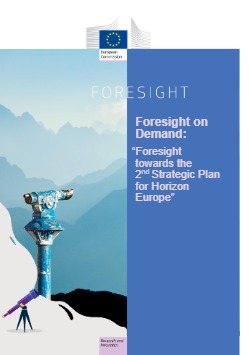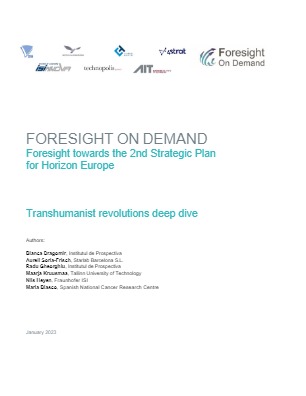The twelve scenarios in this deep dive are informed by transhumanism, portraying futures in which the human condition – our bodies, functions, and lives – and the features of societies are fundamentally transformed by technology. Even though scenarios are built along the lines of particular scientific and/or technological advancements, the discussion spreads over sociotechnical ensembles and the re-conceptualization of the relationship between technology and society by 2040.
The work leading to this report started with a horizon scanning exercise to identify a series of technological innovations and scientific breakthroughs that may be considered key factors towards re-engineering human nature. In parallel, the authors explored diverse narratives regarding the human condition and significance in the world, dreams and fears embodied in the so-called collective imaginary, echoing through myths and fantasies to literature, cinematography and the wider culture. At the intersection of these explorations, twelve topics were selected and further expanded into scenarios. They are not intended to cover the full spectrum of themes regarding human enhancement, but present a relevant ‘sample’ of potential future trajectories.
We propose these narratives as exploratory scenarios, describing futures where both positive and negative consequences are palpable. They are not normative, outlininga vision of the future deemed desirable. We invite readers to regard them as devices for imagining the future and debating the future. They aim to nurture a reflection on the dynamics of change, future opportunities and potential threats, and in doing so they contribute to future preparedness.
Three types of scenarios were developed:
- The first type describe futures where scientific and technological advancements enhance embodied experiences: Sensory augmentation: extending human senses beyond the natural limits and adding sensorial modalities which are not native to humans. Sensory and brain stimulation, psychedelic microdosing: inducing altered states of consciousness, for healing purposes or for fostering new perspectives on being human. Molecular therapies for delaying aging; and new artificial reproductive technologies allowing people to be fertile until much older age.
- The second type explore futures where human capabilities are extended by embodying non-biological means: a significant share of elderly people using exoskeletons for prolonging active life, for maintaining their mobility or as a form of assisted living; brain-computer interfaces leveraged in semi-automatized work environments, to improve learning outcomes, and to control smart devices; Brain to brain communication supporting cognitive and emotion sharing, leading to the creation of ‘hive minds’ covering multiple aspects of life.
- The third type focus on the simulation and replication of the human body and mind: Digital body twins allowing alert signals for disease prevention and the simulation of the short- and long-term effects of a person’s behavior on their health and body; Digital twins of the brain allowing testing hypotheses in cognitive science, in mental health studies, responses to different types of treatments; Digital immersive worlds – gaming/ fantasy worlds or ‘mirror worlds’ that are replicating real-life environments – hosting interactions among people and automated entities; Digital replicas of the deceased changing the socio-political understanding of grief; and Artificial agents with complex underlying computational procedures (including e.g. self-reflection, development of value system, affective computing) and sophisticated interfaces calling for new theoretical frameworks of consciousness.
***
The twelve scenarios presented in this deep dive are part of the Foresight towards the 2nd Strategic Plan of Horizon Europe project, which was conducted by Foresight on Demand Consortium on behalf of the European Commission’s Directorate-General for Research and Innovation (DG RTD).






